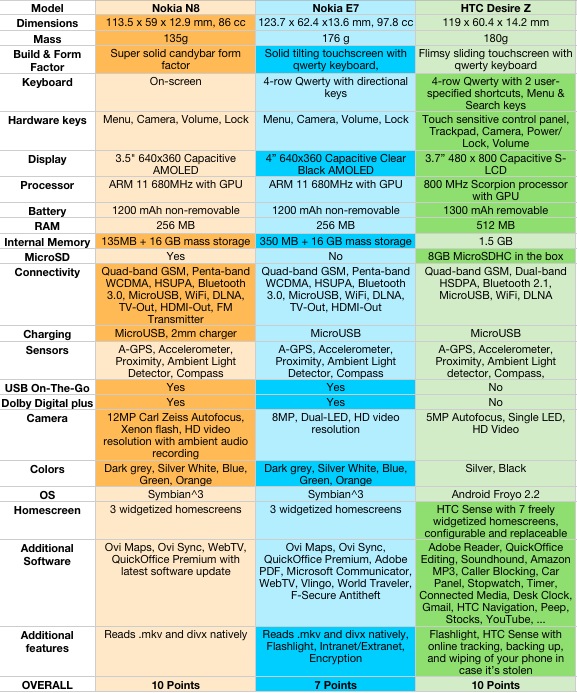In many of my posts about the Nokia E7, ever since I received my trial unit, I kept saying that “I don’t get it”. I don’t understand the purpose of the E7 or who will buy it or for what reason. The rationale behind my thought was that in terms of Symbian competition, the Nokia N8 offers a much more complete package, while in terms of QWERTY/Business competition, there are plenty of better options with Android on board.
However, saying something is not like proving it in an objective comparison of specs, so given that I have an N8, E7 and HTC Desire Z in my hands, I set out to take some pictures of all of them for you, and to do a specifications comparison table.
In the comparison table below, I placed the Nokia E7 in the middle so you can easily spot the differences between it and the Nokia N8 on one side and the HTC Desire Z on the other side. I highlighted the areas where a device is easily a winner (sometimes there are two winners in a category), and I left some others without picking one as they are more subjective and depend on every person’s preferences.
However, specification sheets only tell you half the story. Nothing compares to actually seeing, holding and using a device, as there are a lot of features that shine in that light, and a lot that feel irrelevant.
The three devices rank on the “big” scale, compared to what we considered smartphones 2 years ago. The N8 (hardware tour) is the smallest and lightest of the bunch, it’s also the most drop-proof with its simple form factor. The Desire Z (hardware tour) is the thickest and the least “solid”, it’s quite solid, but not as much as the other two. The E7 (hardware tour) is taller and wider than the Desire Z, in order to accommodate the tilting form factor and the 4″ screen. It’s incredibly well built.
Screen-wise, the Nokia N8 packs nothing really special. The E7 has that awesome 4″ Clear Black Display that shines indoors and is awesome in direct sunlight. The HTC Desire Z has an awesome resolution and colors that pop indoors, however get outside and the screen will be a harder to read in direct sunlight.
For example, simply tilting the 3 devices a bit, shows how clear the Nokia E7’s display remains, and how the Desire Z is affected by surrounding light.
Flip those phones over, and you see the winning point of the N8: it’s unrivaled 12MP Carl Zeiss camera with Xenon Flash. The Desire Z shows a good enough 5MP camera, but a great strength in its removable battery: you can purchase a spare battery and keep it with you when the main one dies for example. The E7, well, it has a fixed-focus (read: non-autofocus) camera and a non-removable battery. Slayed on both fronts!
The E7 gets back a winning point with its transformer form factor. Where the N8 is a simple candybar, and the Desire Z features a fancy-named Z-hinge that eventually just settles flat on top of the keyboard, the E7 has an awesome swiveling screen, that is solidly built and that rises to face you a bit like a computer.
As you see, my theory was quite right. If you’re a Symbian fan, the N8 is a more robust and complete choice, especially with its camera, and if you’re a QWERTY fan, the HTC Desire Z (and many other Android QWERTY devices really), is a better choice than the E7.
The only person I can see getting excited about the E7 is the Symbian + Qwerty fan, however, I can’t help but feel their pain, given the compromises they will have to make. No great camera, no FM transmitter, no MicroSD slot, compared to the N8. No removable battery, no more RAM, none of the great software features of Android or the vast array of third-party applications for office and productivity use that the Market offers, compared to the Desire Z. Yes, it’s a big compromise on both aspects.
Are you interested in getting the E7? Or still doubting whether to purchase it or go a safer route with another device, N8, Desire Z, or otherwise?







